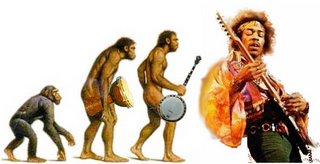 Lancelot Link: Mindless Saturday Morning Fodder... Or The Window Into Our Primoridal Selves?
Lancelot Link: Mindless Saturday Morning Fodder... Or The Window Into Our Primoridal Selves?Mounting evidence suggests that human beings are hard-wired to appreciate music. Now researchers want to know why our ancestors evolved music in the first place.
Researchers at the Montreal Neurological Institute, for example, have scanned musicians' brains and found that the "chills" that they feel when they hear stirring passages of music result from activity in the same parts of the brain stimulated by food and sex.
As evidence mounts that we're somehow hard-wired to be musical, some thinkers are turning
 their attention to the next logical question: How did that come to be? The benefits of our affinity for food (nutrition) and sex (procreation) are easy enough to explain, but music is trickier.
their attention to the next logical question: How did that come to be? The benefits of our affinity for food (nutrition) and sex (procreation) are easy enough to explain, but music is trickier.Some suggest that music originated as a way for males to impress and attract females. In many bird species, for example, males sing to impress females. Depending on the species, females will tend toward the males with the broadest repertoire or the most complex or unique songs.
 The foremost defender of that model today is GeoffreyiMiller, an evolutionary psychologist at the University of New Mexico. Miller argues that in prehistoric communities, singing and dancing might have worked-as they do today in some Native American cultures -- as proxies for hunting and warfare. The ability to come up with imaginative melodies and rhythms would connote intelligence and creativity, and the long, arduous dances would be proof of one's endurance-the sort of traits that a choosy female would like to see in her offspring.
The foremost defender of that model today is GeoffreyiMiller, an evolutionary psychologist at the University of New Mexico. Miller argues that in prehistoric communities, singing and dancing might have worked-as they do today in some Native American cultures -- as proxies for hunting and warfare. The ability to come up with imaginative melodies and rhythms would connote intelligence and creativity, and the long, arduous dances would be proof of one's endurance-the sort of traits that a choosy female would like to see in her offspring. Even today, Miller argues, music retains some of its old procreative roots. Looking at 6,000 recent jazz, rock, and classical albums, Miller found that
 90 percent were produced by men, and that those male musicians tended to reach their peak musical production around age 30, which he notes, is also the peak of male sexual activity.
90 percent were produced by men, and that those male musicians tended to reach their peak musical production around age 30, which he notes, is also the peak of male sexual activity. Miller points in particular to the example of JimiiHendrix. Miller has written that, despite dying at 27,iHendrix had "sexual liaisons with hundreds of groupies, maintained parallel long-term relationships with at least two women, and fathered at least three children in the United States, Germany, and Sweden. Under ancestral conditions before birth control, he would have fathered many more." To Miller, it was Hendrix'sistatus as a music-maker rather than his fame or charisma that gave him this sexual allure.
Edited from the article byiDrakeiBennettifor the Boston Globe. Read it here in its original, expanded form


No comments:
Post a Comment